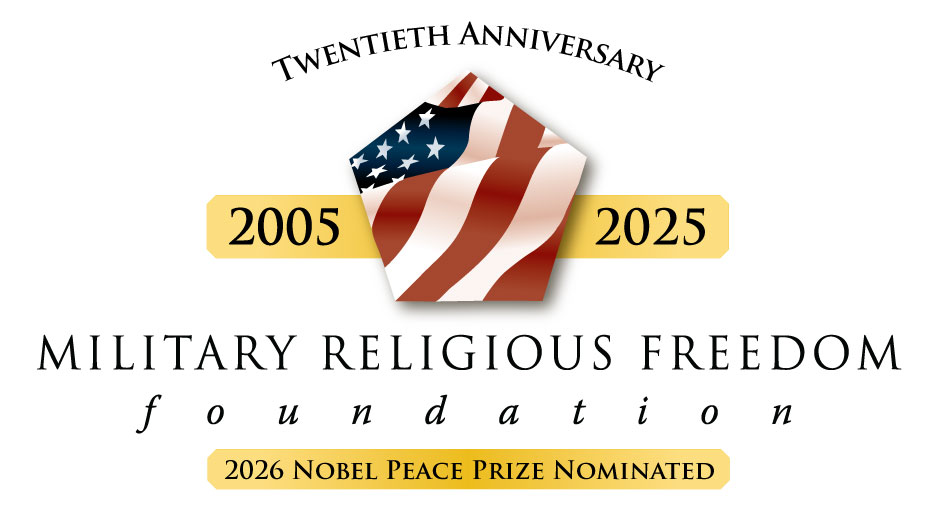‘Tis the Season for Peace and Goodwill: MRFF Board Member John Compere discusses the inclusivity of America’s winter holiday season, emphasizing its secular core values

Our American winter holiday season begins and ends with secular holidays (Thanksgiving Day and New Year’s Day). In between are secular, religious, ethnic, cultural and regional celebrations. They are merging yet different seasonal traditions.
Peace and goodwill are the reasons for the season. Our winter holidays become the season of peace and goodwill when they are inclusive and not exclusive. There will be peace on the earth and goodwill to men, women and children when we respect the traditions of others and reject the badwill of those who presumptuously proclaim their tradition to be the only reason for the season.
Our secular celebrations are inclusive and involve Thanksgiving family gatherings with feasts, Winter Solstice observances, Santa Claus, elves, flying reindeer, red-nosed Rudolph, sleighs with bells, snowmen/women, gift-giving, fireplace stockings, decorative trees, holly, poinsettias, mistletoe, eggnog, candy canes, fruit cakes, caroling, the Grinch, holiday cheer, welcoming the New Year with fireworks, and much more.
Religious celebrations are exclusive and involve only those practicing a particular religion. It is significant to note less than 50% of Americans belong to a church, synagogue or mosque (Gallup) and one in three Americans identify as non-religious or “Nones” (Pew Research ). America is truly a nation of belief independence, freedom and diversity.
Yuletide celebrations and decorated trees originated with pagan winter festivals of Germanic people from European antiquity and are not mentioned in religious scriptures. “Season’s Greetings” and “Happy Holidays” refer to the entire festive period and all traditions. “Merry Christmas” refers to only one day (December 25) and only one event. The word “Christmas” means “Christ’s mass” which is an exclusive ritual of a foreign origin religion.
Early American colonists (Puritans, Congregationalists, Quakers, Methodists, Baptists, et al) opposed celebrating Christmas because it was a Roman Catholic Church ceremonial. Southern States first began the secular celebration of December 25th with feasting, drinking, dancing, gambling, hunting, fishing and socializing. It later became an American public holiday at the initiation of banks and businesses and our biggest commercial holiday.
American Christianities commemorate the fictitious birth date of a foreign Jewish figure from Semitic antiquity named Yeshua ben Yosef (aka: Jesus). The day, month or year of his birth is not known. It was celebrated at different times for 300 years until a 4th Century Roman Catholic pope set it on December 25 to co-opt the pagan winter solstice festival celebrated throughout Europe and designated December 25 centuries earlier by Roman Emperor Julius Caesar. There are three different biblical birth stories (Matthew 1-2; Luke 1-2; Revelation 12).
Saint Nicholas was a 4th Century Eastern Orthodox bishop in Asia and gift giver to children. His December 6th festival day was a holiday dedicated to children. He was recreated as our secular Santa Clause and the date changed to December 25th. This was the genesis for our secular gift-giving tradition.
The term “Xmas” is not sacrilegious, does not replace Christ with an English “X” and does not remove Christ from Christmas. Those who claim otherwise display ignorance of Christian history. “Xmas” originated in the early Christian church as an acceptable abbreviation for Christmas because the New Testament was written in ancient Greek and its letter for Christ was “X”. The Greek letter “X” is deeply rooted in Christianity and has been used as a sacred Christ symbol for centuries by Christian churches.
Knowledge of historical facts about the winter holiday season provides wisdom, insight and perspective. “Facts do not cease to exist because they are ignored” as philosopher Aldous Huxley wisely wrote.
Every member of the American military takes the sworn oath to support, defend and bear true faith and allegiance to the United States Constitution. Fidelity to the secular Constitution is the foundation of American military service. We are one nation under the Constitution and it is the Constitution in which we trust.
The Constitution, Department of Defense directives and Armed Forces regulations prohibit the military from endorsing a religion and require neutrality regarding religion (neither pro-religion nor anti-religion but religion-neutral). At military installations and facilities during this winter holiday season, religious displays and activities are authorized only at military chapels.
Our American military is composed of men and women of different faiths, beliefs, cultures, religions, traditions and ethnic origins. At all times and especially during this winter holiday season, it is incumbent on all military superiors (i.e. officers and non-commissioned officers) to promote the peace and goodwill of inclusiveness which enhances morale and prevent the badwill of exclusiveness which diminishes morale.
Respect for all Americans and their traditions fosters seasonal peace and goodwill. Peacemakers and goodwillers care about fellow Americans, welcome all holiday traditions, accept human belief diversity and avoid publicly imposing their private beliefs on others. Peacebreakers and badwillers do not. More respectful inclusiveness and less disrespectful exclusiveness will ensure peace and goodwill for all during this winter holiday season.
Happy Holiday Trails!
John Compere
Brigadier General, US Army (Retired)
Disabled American Veteran (Vietnam Era)
Board Member, Military Religious Freedom Foundation
Texas rancher
Recent Posts
- October 2, 2025 | 4 comments
- September 30, 2025 | 5 comments



